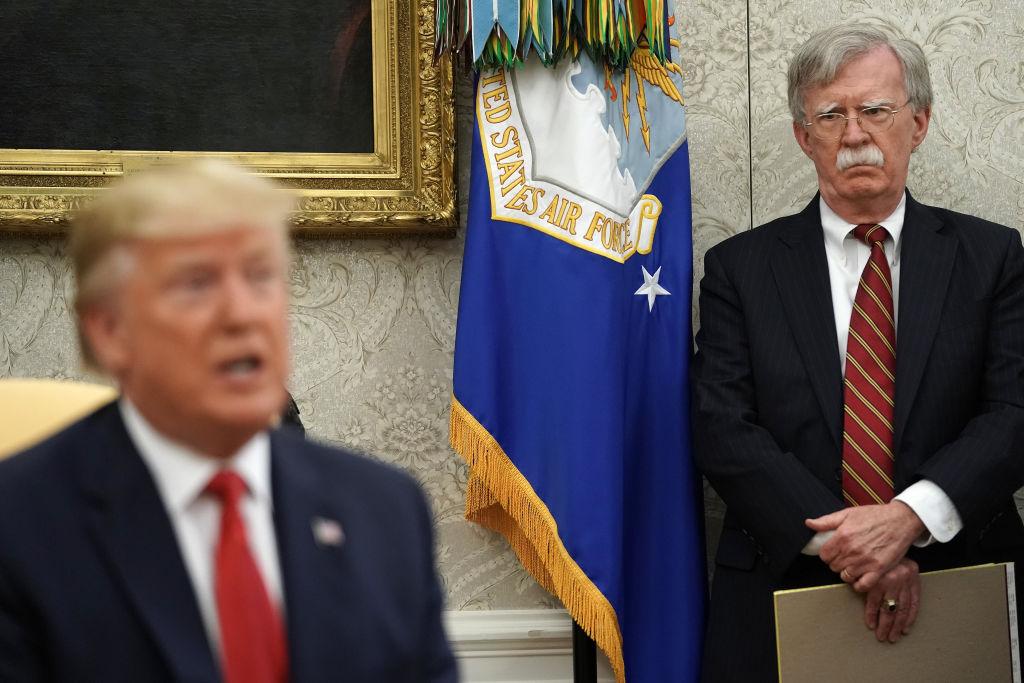
In the latest episode of ‘Donald Trump: The Presidency’, John Bolton is fired, proving that Trump can be the adult in the room. The Taliban didn’t get to mark the 9/11 anniversary at Camp David. The president hones his meteorological forecasting skills and campaigns around the country as though an election was in the offing. Phew! Here’s the scorecard if you’re having trouble keeping up.
First up, its not just the adults (Jim Mattis, H.R. McMaster, Nikki Haley) who have left the room but also the ideologues (Steve Bannon, Bolton). Only the family prevails and even their roles are being more narrowly constrained. This is how Trump wants it. A rapid turnover of key staff means that he stays the central point in the vortex with no one able to hang on for long as a point of stability or source of wise counsel. Not that Bolton is often thought of in connection with either of those missions.
Second, on Bolton, Trump made the right call. With Iran, Syria and Afghanistan—to name three trouble spots—Trump’s instincts have proved to be more risk-averse than Bolton’s reported preferences and the president’s initial grand statements about withdrawing troops or threatening military action. On balance, that’s a good thing. It shows that the president understands the difference between rhetoric and the consequences of making real decisions about military force. Trump tweeted about Bolton, ‘I disagreed strongly with many of his suggestions, as did others in the Administration’. The ‘others’ is presumably Mike Pompeo, who strives to be more in sync with the president. Bolton, a feisty zealot, was never there just to go along for the ride.
Third, get ready for the advent of the Full Trump. Yesterday, on the anniversary of 9/11, Trump had been in office for 964 days. (Trump claims he has done ‘more than any other President in the first 2 1/2 years!’) He’s as comfortable in the Oval Office as he’s ever going to be, and there’s almost no one around him to push back on his less-considered decisions. Witness, for example, the bizarre story that officials at the National Oceanic and Atmospheric Administration were reportedly warned they could lose their jobs for contradicting Trump’s announcement that hurricane Dorian would threaten Alabama. (It did not.) His impulsiveness is obviously risky, but it’s aimed more at the theatre of daily politics than international security, where he emerges as more cautious than his rhetoric would imply.
Fourth, just like in the early months of his administration, the corridors of the White House are ringing hollow. This is the time in the election cycle when political appointees start to move to the private sector if they’re not rusted on to the re-election effort. And when fewer senior figures are willing to step up to difficult and thankless jobs. Trump always said he was going to drain the swamp, but even the most disruptive political figure needs a few trusted advisers around. Gut instinct will only get you so far.
Fifth, the administration never succeeded in getting its own team in place and that has hollowed out the capacity of the presidency to develop and articulate new policy. Trump may not care about that, but as John Howard used to say when he was prime minister, good policy is the foundation of good politics. In international security, for example, the National Security Council seems to have ground to a halt as a vehicle for developing coordinated policy across multiple agencies. Politicians who think that they are their own smartest strategists litter the policy byways of history.
Lastly, it’s all about campaigning. Read the president’s tweets this week and you’ll see they’re liberally sprinkled with endorsements for candidates in a handful of special congressional district elections, as well as state gubernatorial and mayoral positions. Trump held another campaign-style rally in North Carolina and claims that the next presidential campaign against ‘Sleepy Joe’ Biden or ‘Pocahontas’ Elizabeth Warren will be ‘easier than 2016’.
Has there ever been a president more absorbed with campaigning and less focused on governing? What we have seen this week is what we’ll get for the remainder of Trump’s term: intense political campaigning designed to mobilise his base by attacking his ideological opponents.
It is uncertain whether this approach will get Trump re-elected, but what’s clear is that his style of governing is well set and won’t change between now and November 2020.
This is the environment into which Scott Morrison will arrive next week for a state dinner with the president. The challenge for the prime minister is to navigate the hazards of dealing with a president little interested in the history of 100 years of mateship but very focused on the transactional business of alliance relationships.
Australia continues to have an immensely positive brand in Washington. But Trump’s test of the relationship, as of all others, will be ‘What have you done for me lately?’ There’s a good story to tell, but keeping on the right side of an impulsive president has been a tricky task for many world leaders. Morrison would be well advised to have a list of upcoming alliance activities in his back pocket that will show Trump the current and future value of the relationship.